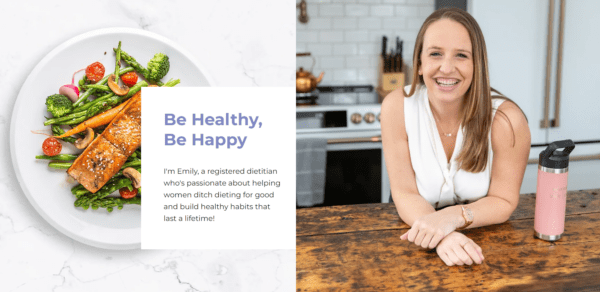Welcome to our guest blogger, Emily Tills, (Registered Dietitian and Owner of Nourished with Emily)

Have you ever experienced guilt after indulging in your favorite treats like ice cream or chips? That moment of pure enjoyment quickly turns sour as you put away the container, overwhelmed with dread and remorse. If you can relate to this scenario, you’re not alone. Many individuals struggle with feelings of remorse and self-criticism after deviating from their diet or consuming foods they perceive as “off-limits.”
Our relationship with food often traces back to our earliest memories, shaped by the attitudes and behaviors surrounding food in our upbringing. For some, constant cravings for sweets, soda, or salty snacks stem from childhood restrictions on these foods. Negative associations with eating, such as secretive behavior or fear of certain food groups, may also result from past experiences. But the good news is that we have the power to redefine our relationship with food and cultivate a healthier approach.
So, how can you tell if your relationship with food needs some attention?
If you find yourself constantly preoccupied with thoughts of food, experiencing fear or guilt around eating certain foods, or using food as a coping mechanism for stress, it may be time to reassess your relationship with food. While it’s natural to have preferences and quirks when it comes to food, feeling controlled by emotional impulses or cravings is a sign that intervention may be beneficial.
Distinguishing between true hunger and emotional cravings is key to developing a healthier relationship with food. Next time you reach for a snack out of habit or stress, take a moment to pause and reflect on your intentions. Are you truly hungry, or are you seeking comfort or distraction?
One tool that we like to use inside of Nourished with Emily is sticky dots. Grab 3 colored stickers that you can put inside your snack cabinet and assign 3 meanings to the colors, labeling them for reasons why you eat like boredom, anxiety, stress, procrastination, and hunger. Make sure there is a hunger stick. When you go in to grab that snack, stop and look at the colored dots and ask yourself, why am I here? What is bringing me to the cabinet? If you’re hungry, then eat! If you’re not, see if you can fill that time with something else like a walk, reading, cooking, and more.
How can a Registered Dietitian assist you in improving your relationship with food?
At Nourished with Emily, we understand that rebuilding a healthy relationship with food is a gradual process that goes hand in hand with achieving your health goals. Whether you’re aiming for weight loss, managing chronic conditions, or simply seeking a balanced lifestyle, addressing your relationship with food is crucial for sustainable results. Our approach focuses on creating balanced meals, recognizing hunger and fullness cues, and establishing healthy eating patterns tailored to your needs.
By collaborating with a Registered Dietitian at Nourished with Emily, alongside the guidance of an Onondaga Physical Therapist, you’ll have a dedicated team supporting your journey to optimal health and well-being.
For more information, delicious recipes, and additional resources, visit our website at Nourishedwithemily.com or follow us on Instagram @Nourishedwithemily.
Keep Reading…
5 Reasons You Need a PT To Coordinate Your Fitness Regimen
Physical therapists aren't just for people that are [...]
Protect Against Alzheimer’s Disease: How to Decrease Your Risk of Mental Decline
Alzheimer’s disease is a progressive mental decline affecting one’s [...]
10 Ways To Turn Daily Activities Into Exercise
Looking for some easy ways to get more exercise? [...]




